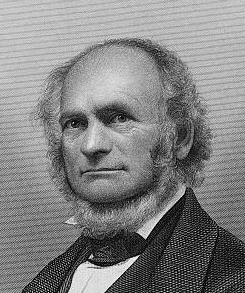Biographical Details
Date of Birth: April 26, 1802
Birth Location: Natick, MA, USA
Major Study: Theology
Graduation Year(s): 1837
Degree(s) Earned: Doctor of Divinity (Honorary)
Date of Death: August 22, 1886
Death Location: Hartford, CT, USA

Date of Birth: April 26, 1802
Birth Location: Natick, MA, USA
Major Study: Theology
Graduation Year(s): 1837
Degree(s) Earned: Doctor of Divinity (Honorary)
Date of Death: August 22, 1886
Death Location: Hartford, CT, USA
Calvin Ellis Stowe was born in 1802 in New England. His father died when Stowe was just 6 years old. His mother was too poor to take care of him so he was sent to the home of his grandparents for room and board. At age 12, he was apprenticed to a paper maker. He developed “an insatiable craving for books,” studying whenever he could find time. Somehow, he attracted the attention of benefactors who sent him to Gorham Academy in Maine. After preparatory study there, he attended and graduated in 1824 from Maine’s Bowdoin College. He stayed on an extra year as a librarian. He then attended and graduated from Massachusetts’ Andover Theological Seminary in 1828.
Stowe’s scholarly thesis was published in the U.S. in 1828 and in London the next year. In 1829, he became editor of the Boston Recorder, even as he continued publishing works as a Biblical scholar. He became professor of Greek at Dartmouth College in 1830, and professor of Sacred Literature at Lane Theological Seminary in the Cincinnati area in 1832. He also helped to establish the College of Teachers there in 1833. He taught at Lane, his longest place of employment, from 1833 to 1850.
In May 1836, Stowe’s father-in-law, Lane Seminary’s president, Lyman Beecher, sent him to England to purchase a library for the seminary. Hearing of his visit, the Ohio State Legislature officially appointed him to study the public schools of Europe. Upon his return to the U.S., Stowe wrote the book, Report on Elementary Education in Europe, of which the state legislature immediately ordered 8,500 copies (one for each of its school districts). It quickly spread to other states’ attention.
In 1837, Indiana College (now IU) awarded him with an honorary Doctor of Divinity degree.
In 1850, Stowe and his family moved to Brunswick, Maine, where he accepted a teaching job at his alma mater, Bowdoin College. That same year, the Fugitive Slave Law of 1850 was passed. Stowe and his wife Harriet supported the Underground Railroad, helping African Americans escape slavery. They even housed several fugitive slaves in their own home.
In 1853 and 1856, Stowe and Harriet visited Europe. In 1864, they moved to Hartford, Connecticut, “a neighborhood populated by prominent citizens.”
While Stowe supported his wife’s success and literary enterprises, he continued publishing biblical works, including his best-selling 1867 book, Origin and History of the Books of the Bible, Both Canonical and Apocryphal.
In 1867, Stowe bought a winter home in Mandarin, Florida, which he and his wife enjoyed greatly during the rest of their years together.
Stowe died in 1886. The inscription on his tombstone reads, “The common people heard him gladly.” Mark, XII, 37.
Stowe married Harriet Beecher on January 6, 1836 in Cincinnati. He and Harriet had seven children, including a set of twins, but only three survived their parents. Harriet and Eliza were born in 1836, Henry in 1838 (drowned at age 19 in a swimming accident), Frederick in 1840 (mysteriously disappeared on his way to California in 1870), Georgiana in 1843 (a morphine addict, died from septicemia in 1890), Samuel in 1849 (died from cholera while still an infant), and Charles in 1850.
Harriet had a vision during Communion service in the college chapel of a dying slave in 1850, which inspired her to write a story about slavery. From 1851 to 1852, Harriet published an anti-slavery serial. There were 41 installments, which would later be published as Uncle Tom’s Cabin. It was one of the best-selling books of the 19th century, both popular and controversial, fueling the fire of the abolition movement in the U.S.
In 1862, President Abraham Lincoln invited Harriet to Washington, DC. One of her sons later reported that the president said to Harriet, “So you are the little woman who wrote the book that started this great war.”
Harriet corresponded with contemporaries: Frederick Douglass, Mark Twain, Henry Wadsworth Longfellow, Charles Dickens, and Nathaniel Hawthorne.
Stowe’s own childhood stories were the basis for Harriet’s subsequent books: Oldtown Folks (1869) and Old Fireside Stories (1872).
In the 1870s, Harriet wrote a series of articles for Christian Union magazine about Florida, which were then published in book form. Mary McTammany said the articles brought 14,000 tourists to the southern state and attributed Harriet’s articles with the beginning of Florida tourism from the north.
Harriet’s brother, prominent American minister Henry Ward Beecher, died in 1887. Harriet declined physically and mentally thereafter, afflicted with what was probably Alzheimer’s disease. By 1888, she was mentally unable to help two Hartford publishing houses write her autobiography and was spending several hours a day “writing” Uncle Tom’s Cabin, forgetting that she had already written it, anticipating its “future” success.
Mark Twain, her neighbor, famously wrote in his own autobiography about how Harriet would wander back and forth between his property and her own.
Harriet died in 1896.
Stowe and Harriet’s youngest child, Charles, became a pastor and went on in 1912 to write a biography of Booker T. Washington and (with his own son Lyman) a biography of his mother Harriet. Charles lived to 1934. Lyman became a church lecturer and lived to 1963.
In the 2019 film, Sons and Daughters of Thunder, written about Harriet’s early life, Stowe was portrayed by actor Daniel Rairdin-Hale.